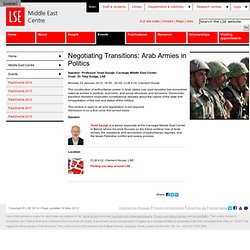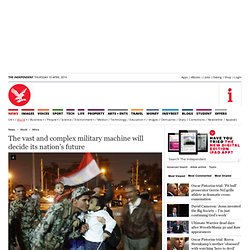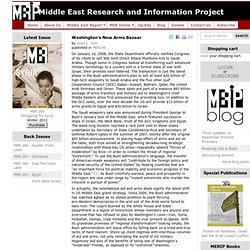

The business of War. The Israeli Military. ME states in the Global Military Order. Negotiating Transitions: Arab Armies in Politics - 2012 - Events - Middle East Centre. Speaker: Professor Yezid Sayigh, Carnegie Middle East Center Chair: Dr Toby Dodge, LSE Monday 23 January 2012, 18.30 - 20.00, CLM 4.02, Clement House The construction of authoritarian power in Arab states over past decades has enmeshed national armies in political, economic, and social structures and dynamics.

Democratic transition therefore implicates constitutional debates about the nature of the state with renegotiation of the role and status of the military. This lecture is open to all and registration is not required. Admission is on a first come first served basis. Speaker Yezid Sayigh| is a senior associate at the Carnegie Middle East Center in Beirut, where his work focuses on the future political role of Arab armies, the resistance and reinvention of authoritarian regimes, and the Israel-Palestine conflict and peace process.
Location CLM 4.02, Clement House, LSE Finding you way around LSE| The vast and complex military machine will decide its nation’s future - Africa - World. Since it started in the late 1970s, US military aid to Egypt has totalled a staggering $40bn (£24.9bn).

It is now charged, since the collapse yesterday of the 30-year-old Mubarak regime, with running the country. Some 40 per cent of troops are conscripts, suggesting that, despite its size, and its influence over Egyptian society, it is yet to make the transition to being a professional military force. Personnel structures remain rigid, there is no recruitment channel from the ranks of non-commissioned to commissioned officers and a single re-enlistment choice for conscripts is for 20 years further service. However, the internal structures belie the fact that the military is central to the narrative and historical reality of the emergence of contemporary Egypt, a message that is driven home not least by an impressive array of military museums, through curricula for the teaching of Egyptian history, and in the media, which lionises the past and present roles of the military.
Washington's New Arms Bazaar. On January 14, 2008, the State Department officially notified Congress of its intent to sell 900 Joint Direct Attack Munitions kits to Saudi Arabia.

Though some in Congress balked at transferring such advanced military technology to a country still in a formal state of war with Israel, their protests soon faltered. The transaction is just the latest phase in the Bush administration’s plan to sell at least $20 billion of high-tech weaponry to Saudi Arabia and the five other Gulf Cooperation Council (GCC) states—Kuwait, Bahrain, Qatar, the United Arab Emirates and Oman. These sales are part of a massive $63 billion package of arms transfers and military aid to Washington’s chief Middle Eastern allies first announced the preceding July.
In addition to the GCC sales, over the next decade the US will provide $13 billion of arms grants to Egypt and $30 billion to Israel. The Saudi weaponry sale was announced during President George W. Rewarding Authoritarianism Priming Israel’s Aid Pump. The Egyptian Military...